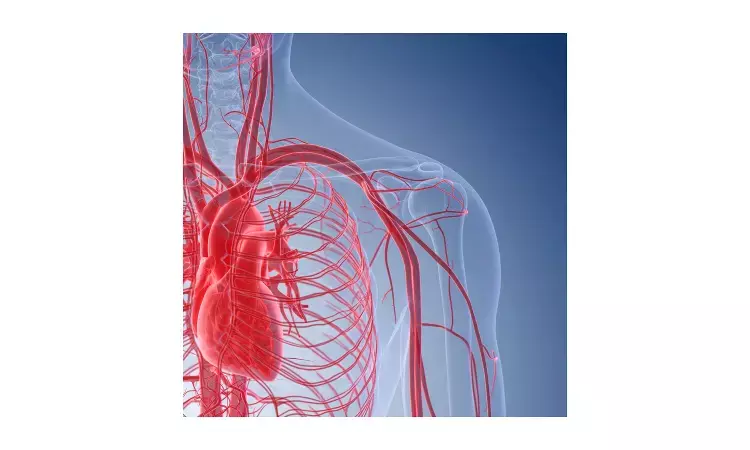- Home
- Medical news & Guidelines
- Anesthesiology
- Cardiology and CTVS
- Critical Care
- Dentistry
- Dermatology
- Diabetes and Endocrinology
- ENT
- Gastroenterology
- Medicine
- Nephrology
- Neurology
- Obstretics-Gynaecology
- Oncology
- Ophthalmology
- Orthopaedics
- Pediatrics-Neonatology
- Psychiatry
- Pulmonology
- Radiology
- Surgery
- Urology
- Laboratory Medicine
- Diet
- Nursing
- Paramedical
- Physiotherapy
- Health news
- Fact Check
- Bone Health Fact Check
- Brain Health Fact Check
- Cancer Related Fact Check
- Child Care Fact Check
- Dental and oral health fact check
- Diabetes and metabolic health fact check
- Diet and Nutrition Fact Check
- Eye and ENT Care Fact Check
- Fitness fact check
- Gut health fact check
- Heart health fact check
- Kidney health fact check
- Medical education fact check
- Men's health fact check
- Respiratory fact check
- Skin and hair care fact check
- Vaccine and Immunization fact check
- Women's health fact check
- AYUSH
- State News
- Andaman and Nicobar Islands
- Andhra Pradesh
- Arunachal Pradesh
- Assam
- Bihar
- Chandigarh
- Chattisgarh
- Dadra and Nagar Haveli
- Daman and Diu
- Delhi
- Goa
- Gujarat
- Haryana
- Himachal Pradesh
- Jammu & Kashmir
- Jharkhand
- Karnataka
- Kerala
- Ladakh
- Lakshadweep
- Madhya Pradesh
- Maharashtra
- Manipur
- Meghalaya
- Mizoram
- Nagaland
- Odisha
- Puducherry
- Punjab
- Rajasthan
- Sikkim
- Tamil Nadu
- Telangana
- Tripura
- Uttar Pradesh
- Uttrakhand
- West Bengal
- Medical Education
- Industry
PVCs and echocardiographic abnormalities during recovery associated with increased cV mortality

Exercise-induced premature ventricular contractions (PVCs) are common findings in exercise stress testing and have been described to associate with increased risk of cardiovascular (CV) mortality, especially when occurring during the recovery phase.
A recent study in MedRixv by Thomas Lindow, and team revealed that PVCs during recovery were associated with increased prevalence of echocardiographic abnormalities. Increased risk of cardiovascular mortality was observed only for subjects with PVCs if concomitant echocardiographic abnormalities were present.
The study evaluated echocardiographic abnormalities (reduced left ventricular (LV) ejection fraction, valvular heart disease, LV dilatation, LV hypertrophy, or increased filling pressures) and PVCs during recovery (≥1/min) were identified among patients having undergone echocardiography within median [interquartile range] 0 [0-2] days of an exercise stress test. The association between such changes and cardiovascular mortality was analyzed using Cox regression adjusted for age, sex, clinical and exercise variables.
The results of the study were
• Among 3,106 included patients, PVCs during recovery were found in 1,327 (43%) patients, among which the prevalence of echocardiographic abnormalities was increased (58% vs. 44%, p<0.001).
• Overall, PVCs during recovery were associated with increased cardiovascular mortality (219 total events, 7.9 [5.4–11.1] years follow-up; adjusted hazard ratio (HR [95% confidence interval]) 1.6 [1.2–2.1], p<0.001).
• When combined with echocardiographic abnormalities, PVCs during recovery were associated with increased risk when such were present (HR 3.3 [1.9–5.5], p<0.001) but not when absent (HR 1.5 [0.8–2.8], p=0.22), in reference to those with neither.
Authors concluded that "PVCs during recovery were associated with increased prevalence of echocardiographic abnormalities. Increased risk of cardiovascular mortality was observed only for subjects with PVCs if concomitant echocardiographic abnormalities were present. Our findings provide mechanistic insights to the increased CV risk reported in patients with PVCs during recovery."
Reference: https://doi.org/10.1101/2021.12.22.21268216
Medical Dialogues consists of a team of passionate medical/scientific writers, led by doctors and healthcare researchers. Our team efforts to bring you updated and timely news about the important happenings of the medical and healthcare sector. Our editorial team can be reached at editorial@medicaldialogues.in.
Dr Kamal Kant Kohli-MBBS, DTCD- a chest specialist with more than 30 years of practice and a flair for writing clinical articles, Dr Kamal Kant Kohli joined Medical Dialogues as a Chief Editor of Medical News. Besides writing articles, as an editor, he proofreads and verifies all the medical content published on Medical Dialogues including those coming from journals, studies,medical conferences,guidelines etc. Email: drkohli@medicaldialogues.in. Contact no. 011-43720751


